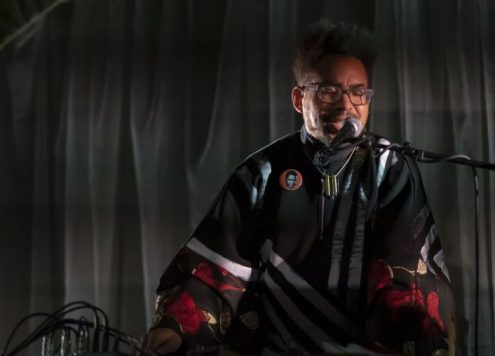Today, normalcy is running out to the pharmacy to get a rapid covid exam, which I was dreading but had to be done. It takes me away from everything that’s important to me (family, work, etc.) Were closer to true normalcy now more than ever. That’s what I’m banking on.
Mark Mallman is no stranger to music and today he dropped his ninth album, Happiness a pop enthused album of tracks that can’t, that won’t be denied. Mallman has flown under the radar for so long never receiving the accolades he deserves but with such a strong outing here, he shouldn’t find a problem getting what’s due to him. And then some. The opening title track is filled with horns, piano, guitars, and an unstoppable melody. The deep bassline can’t be denied either. The ballad-esque “For Love I Will Let Love Go” is interesting. The song is wrapped around strings, piano, and percussion as Mallman sings/speaks, commanding the moment. It’s just amazing.
Discussions with others about a band I’m unfamiliar with lead to some interesting remarks. On one side, some feel the group showed promise with its first release while others, not so much. I took it all in, both the positive and the negative but in the end, it’s about making my own assessment of what’s right in front of me.
It’s New York’s LAPÊCHE I’m referring to. The group just released its sophomore full-length, produced by J. Robbins, and I refuse to listen to the band’s debut until after I make my full assessment of Blood In the Water (New Granada Records). The group’s opener “Finally Trying” is unexpectedly powerful with loads of distorted guitars along with a pummeling rhythm section. Vocalist/guitarist Krista Diem doesn’t overpower the song with her vocals although the instruments make way for her to rage through it. The slight dynamic variations add much to the song’s appeal. Ok, I’m in. “Oliver” has some clever melodic sequences throughout that shift within the song itself. What doesn’t work for others, seems to move in LAPÊCHE’s favor. When the band shifts its melody as Krista sings “Half baked, half right, half sick, half light, half closed, half cry, half yours and half mine,” yeah, it’s captivating. The juxtaposition isn’t lost as the band delivers it with an upbeat fervor with subject matter on the opposite end of the spectrum.
But it’s “Hopes For The Past, Regrets For The Future” where the band maneuvers around delicately with harmonies, leaving listeners intrigued by the powerful delivery the band members make. Intricate movements are made as guitars follow one another, never making a misstep. The morose “Salt and Sweet” is controlled and delicate as well and this is one moment the passion is reeling from start to finish. Strings are heard in the distance but they’re audible and captivating. With “B. Gentle,” Krista’s vocals are alluring here. There’s nothing forced as she and the rest of the band rise and fall musically throughout the track. The unexpected string arrangements closing out the song add so much charm.
LAPÊCHE has a way with melody it encapsulates within its music. The entire band offers up a distinct piece of the puzzle it probably wouldn’t have if one piece was missing. Blood In the Water has some definitive intricacies that allow it to stand apart from LAPÊCHE’s contemporaries. Yes, this is a fine body of work…no, it’s more than that, the band is reaching for greatness here.
Facebook | Twitter | Instagram
“I feel a change a coming / I feel the ground a rumbling / it’s in the breeze in the leaves and I think it be erupting / we need to peep the thumping / the planet’s speaking ‘hush man’ / but we knee-deep in the greed ‘cause we think it leads to something” are the opening lines of Chris Conde’s “Leaves (feat. Rodleen Getsic)” and it’s deep in Engulfed In The Marvelous Decay (Fake Four Inc.), his latest release. It’s an album thick with tracks that are bound to get your attention. I’m stuck here. “Leaves” is an odd track that not many could find solace through the plucked strings of a banjo. It’s one of the five songs Conde self-produced on the release, which also features production handled by K Death of Moodie Black, Lazerbeak, Whatever Cecil, and others. But as I circle back to “Leaves,” I’m left smitten by the emcee out of Texas who works the song around a distinct rhythm’s quiet storminess. With haunting background harmonies, Conde raps here about killing hate with love. With so much growth needed, my pessimism overshadows any optimistic ideas I may have, but what Conde raps is welcomed.
Conde’s catalog of music isn’t extensive but what’s lacking in quantity is made up exponentially in talent and quality. Last year Conde ripped through the Conde Digital EP which was mind-numbing and left listeners scratching their heads in awe. …Marvelous Decay will undoubtedly do the same. But let’s rewind a bit here. Conde opens the release with “Light Repeating,” which has overdubbed vocal harmonies drawing similarities to Craig Wedren. While I’m unable to stomach Wedren’s work for extended periods of time, Conde utilizes his voice in a much more appealing fashion, creatively blending tones that shouldn’t seem to go together well, but do. The track is followed by the Lazerbeak-produced track “Mariposa” where no shorts are taken. Conde is emphatically who Conde is, never apologizing, taking full control. The beat Doomtree’s Lazerbeak provides is abrupt, dissonant at times and noisily edged, which suits Conde’s delivery perfectly. On the track, there’s play with both vocals and melody, and we can hear the clear difference in rhymes as well as the chorus. “Cancel Culture Blues” takes things even further with that Moodie Black involvement. The beat is harsh and abrasive with distorted guitars that are an apocalyptic call to arms. Here Conde takes on the quick social media action of cancel culture. The reckoning comes quickly leaving no room for forgiveness a majority of the time.
Anyone can think whatever they will of the artist but rest assured, Conde couldn’t give two shits about it. On the frenetic “American Faggot” Conde spins words around like a master weaver clearly giving the haters all that they want, but tossing his hair to the side unaffected. The guitars are energetic, playing with lots of dissonance, and comes across as a rock song but we could all care less because here, Conde doesn’t fuck around!
With “Everyday,” the slow drawl of the Thirty-Sixxxth’s beat is captivating. It’s similar unto Kenny Segal’s style and here it works, with Conde’s words revolving around adaptability. Conde is not going to be painted into a corner unless Conde decides to. Hell yes. But it’s probably “The Summer Of Our Discontent (feat. Ceschi)” that’s a standout cut here. It’s the pandemic-induced theme song that can’t be toppled over by anyone. Both Conde and Ceschi volley rhymes with one another and we can all feel the depression, fear, and sadness throughout it. Whatever Cecil’s morose backdrop suits their words well. Insert sad face “here.” There’s so much more that shouldn’t be ignored here like the odd “Okinawa” which has Conde waxing poetically; the jazzy “Re-emerge,” where Conde relay races the words spit against each other; or “Seat At The Table,” another Lazerbeak joint that moves organically. And there’s still so much to touch on with this album that’s probably going to be a welcomed surprise for anyone.
If you haven’t guessed it, Chris Conde’s Engulfed In The Marvelous Decay is on track to being one of the best releases of 2021. Here Conde gives us all a few different looks and can ravage songs at the drop of a hat or coast, riding the beat for all its worth. Any way we receive Conde, it’s well worth it.
Facebook | Twitter | Instagram
There are moments when I’m taken through fantastic journeys of space and sound. These are unequivocally some of the best times witnessed. There are artists that put listeners through the wringer, always offering up a plethora of musicality that’s consistent and allows further exploration, journeying through the psyches of the artist themselves. That’s what goes on here.
Damon Locks is possibly the artist we all never saw coming. Sure he’s been implemental in an assortment of groups, like the post-punk Trenchmouth in the 90s which was more than just post-punk. He later reconvened with former Trenchmouth member Wayne Montana to form The Eternals, where the band explored music in an unrestrained fashion, rife with experimentation and thick with a delectable bottom end. There has been involvement with other projects but Locks isn’t just a musician, he’s also a visual artist, which he’s been able to incorporate into the music created, fine-tuning the cover art for releases throughout the years. His latest project, Black Monument Ensemble has just released its sophomore release and it’s possibly the most realized work to date. NOW (International Anthem) begins where Where The Future Unfolds leaves off, only this time all the players and singers (Angel Bat Dawid – clarinet, Ben LaMar Gay – cornet & melodica, Dana Hall – drums, Damon Locks – samples & electronics, Arif Smith – percussion, Phillip Armstrong, Monique Golding, Tramaine Parker, Richie Parks, Erica Rene, Eric Tre’von) have reached a level that I wasn’t certain even existed.
In all honesty, in one sitting, I’ve listened to the album three times consecutively. Each time not realizing the album came to an end. It’s not abrupt by any means as the songs compiled here are rich in texture and allow the natural flow of each track to take on a life of its own. The 7+ minutes of the opening title track, “Now (Forever Momentary Space)” blends wind instruments with what sounds like a repetitive dial pad off an old 90s cordless phone before the singers chime in, allowing freedom within the vocal harmonies. It’s driven mainly by the percussion and wind instruments though. The cicadas in the background are a welcomed addition as one of the vocalists even addresses its beauty as the track closes. As the album progresses I find myself fascinated by Damon Locks’ sound manipulation. On “The People Vs. The Rest Of Us,” the bassline is milked for all its worth. He inserts a myriad of samples that serve as historical moments alongside the music as well because this is more than just about music, it a peek into society.
“Keep Your Mind Free” finds more of Locks’ manipulation opening the track with looped percussion, also including an obscure movie sample, but when the drums are blended in, it’s completely organic and flows naturally. When that cornet hits, it hits HARD. The solo offered up is free-flowing and difficult to resist and we all may find ourselves caught up in its hypnotic draw.
It’s the first 32 seconds of closing “The Body Is Electric” that will allow listeners to truly think, possible reassess their lives with the social commentary that’s included here in the excerpt “Sometimes what happens is you get so caught up in the daily rigors of running and jumping and racing that you don’t have time to see that you’re not going anywhere.” Ok, maybe this forces me to reassess my own life choices, but regardless, what follows is a loosely construct, reminiscent of a jam session although keeping hold to Locks’ steady idea conveyed through the music. Yes, this track at almost 10 and a half minutes is possibly my favorite as instruments crash against one another at times, the choir leading the way as we hear Locks’ electro wizardry in the background. The rhythms you’re able to pick apart from different African and Latin cultures and in the end, just like me, you’ll be shaking that ass!
Where do we go from here? Well, the real question really is, where do Damon Locks and the collective of musicians in Black Monument Ensemble go? NOW is going to be difficult to top but I’m sure, given time, the group will probably reinvent itself to create another masterpiece. And that’s exactly what this is.











Social Media